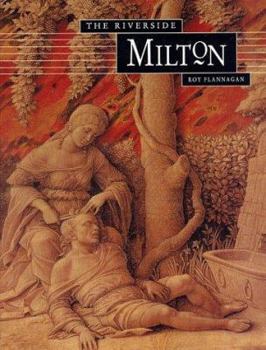The Riverside Milton
The first one-volume anthology of John Milton's complete poetry and selected prose to be published in over 30 years, The Riverside Milton reflects the highest quality and most current scholarship. As... This description may be from another edition of this product.
Format:Hardcover
Language:English
ISBN:0395809991
ISBN13:9780395809990
Release Date:March 1998
Publisher:Cengage Learning
Length:1248 Pages
Weight:4.27 lbs.
Dimensions:2.1" x 8.3" x 10.3"
Related Subjects
Criticism & Theory Education & Reference English as a Second Language English Literature Essays Essays & Correspondence Foreign Languages History & Criticism Humanities Literary Literary Criticism Literary Criticism & Collections Literature Literature & Fiction Movements & Periods Poetry Religion & Spirituality Words, Language & GrammarCustomer Reviews
4 ratings
Great supplier
Published by Thriftbooks.com User , 15 years ago
The book got here before the estimated delivery date, in exactly the condition described. I am very pleased!
Despite problems, Flannagan's still "The One"
Published by Thriftbooks.com User , 20 years ago
This is the edition that made me fall in love with Milton as a graduate student, and that's high praise indeed. Most of the criticism of this volume is sound, but we must remember above all that this edition is the best single-volume edition we have, given that Merritt Hughes' edition is now out of print. Moreover, Hughes' notes are now out-of-date; the graduate student will still wish to consult them, but Flannagan's is a worthwhile successor. Of particular note are the introductions to the texts, which not only frame each work historically but also in terms of its reception and themes -- the introduction to Paradise Lost is particularly masterful. For major works, the introductions include timely bibliographies and are an invaluable resource. Flannagan's detractors ably point out that his notes mix objective commentary, such as historical references or textual variants, with more interpretive notes. We all may wish that certain notes were added, particularly referencing textual parallels, but what we have here is nonetheless spectacular. One must adopt a critical attitude, however: we are invited, implicitly, to argue with Flannagan -- and we must have enough accumen to distinguish between objective and interpretive notations. Certainly, undergraduates may find this difficult -- but I've never shied away from challenging texts that I assign, and learning to do so is indeed part of what they ought to be learning. Moreover, while we might quibble about which notes Flannagan ought to add, I don't find his notes on minor textual variants at all distracting -- rather, they are crutial to such a one-volume work. And while some notes are particularly idiosyncratic, I rather like that: if anything, it makes Milton accessible and encourages the idea that readers need to think for themselves and engage in the give-and-take of ideas. The size of the book is also an advantage: Hughes' was of smaller proportions, and I find Flannagan's an good distribution of text, notes, and white space convenient for notations. Less complete editions of Milton's work lack the overarching connections Flannagan achieves here. Hughes remains a titan, but is out-of-date as well as out-of-print. And the hardbound complete collections of Milton's work, while worth consulting in libraries for scholarship, are neither portable nor intellectually accessible in comparison to Flannagan's introductions and notes. I agree, however, that a second edition is much needed. The table of contents does not list the titles of the shorter poems, and there are some bizarre elements, including a few times where the page breaks too early, leaving a strange amount of white space on the page. Typos do exist, but probably at a lower rate than most books. That said, you needn't wait for the long-promised second edition: if you can by any means afford to do so financially, engage Milton today. Though annoying, the missing table of contents can easily be constructed by the reader
The Riverside Milton, yet once more . . .
Published by Thriftbooks.com User , 24 years ago
Flannagan's update of Hughes is a trailblazing piece of editorial history, one written, formatted, finalized, and agonized over almost exclusively by the author in his home study, and provided as camera-ready copy in short order to a publisher whose timelines were, to put it mildly, ambitious.As such, it carries all of the idiosyncratic flaws of any new approach to an old methodology, but with a decidedly cutting-edge twist: Prof. Flannagan makes the first attempt I'm aware of in scholarly publication to engage the reader interactively in improvement of the product, in that the Introduction provides the editor's e-mail address, and asks the reader to submit questions/comments/suggestions directly to the source, as he or she sees fit.Prof. Flannagan has as a result already made a number of positive changes to an edition whose aim is not to dazzle the accomplished Milton scholar with its editor's erudition (Fowler's achievement enjoys that reputation unchallenged), but to entice and intrigue and support and encourage the relative newcomer to Milton studies. I am aware that The Riverside Milton is evolving and growing and reaching an even greater level of refinement and usefulness even as I write this review, becoming, not all things to all people, but the teaching and learning tool of its audience's desire. I too have a 30-year old copy of Hughes (as do most competent Milton scholars "of a certain age"), well-worn and frequently consulted . . . with the Riverside Milton at its side.
Overall this is a pretty o.k. book
Published by Thriftbooks.com User , 26 years ago
The Riverside milton is a pretty good book because of the organization and works that Flannagan chose to use. ON the other hand watch out for the editor's notes. They tend to be full of opinion or useless information.






